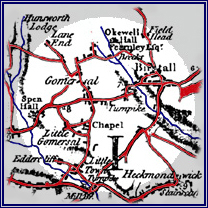


Lt. Col. John Gomersall's Napoleonic War
|
Chapter 27 In the Portuguese Service
“The Sixteenth or Regiment of Viera Telles is a corps much celebrated in the annals of the Portuguese Army. It is one of those which was sent to France during the reign of General Junot yet it was one of those first organised after the expulsion of that General. This regiment was warmly engaged with Soult’s army at Oporto and received the particular thanks of Lord Wellington (then Sir Arthur Wellesley) for its gallant conduct. During the last 3 years, the Sixteenth Regiment has been almost always engaged in skirmishes with the enemy and on every occasion has behaved well. It was formed and disciplined by Lt. Col. Doyle late of his Majesty’s eighty seventh regiment. At present it is commanded by Colonel Neil Campbell of his Majesty’s Fifty Fourth Regiment. The sixteenth as already observed is brigaded with the First Regiment.” “The First regiment
was raised in Lisbon and was always considered as holding a
more respectable rank in the general line than any other, being
esteemed in some measure the Guards of the Court or household
troops of the sovereign. Brigadier General Pack seems to have taken command of the Brigade in June 1810 at which time Lieutenant Colonel John Milley Doyle was commanding the 16th Portuguese Infantry Regiment. Lieutenant Colonel Neil Campbell was appointed Colonel of the Regiment in April 1811 and continued in command until January 1813, when he became ill and returned to England. John Gomersall took over until he was transferred to the 2nd Regiment in July 1813. According to a memorandum dated 23rd August 1812, John Gomersall had already commanded the 16th for 3 months and Lieutenant Colonel Richard Armstrong for 2 months during the previous 2 years whilst Campbell was ill. Interestingly Neil Campbell was charged with escorting Napoleon to Elba and guarding him during his exile. Napoleon escaped whilst Campbell was visiting Italy seeking medical treatment. How he managed to abscond with the whole Imperial Guard is something of a mystery. Campbell was appointed governor of Sierra Leone in 1826 and died there a year later. John Milley Doyle was the nephew of two well repected generals and had joined the army in 1794 at the age of 13. After leaving the 16th, he was put in command of the 6th Portuguese Brigade and left the service in 1814. He led a somewhat notorious life, involved in Portuguese politics was imprisoned in Portugal, sued for bankruptcy in England and accused of having two children by a portuguese woman who it was said he had married to a publican in Cork. However he was appointed a Military Knight of Windsor and Serjeant at Arms to Queen Victoria in 1853. He died in 1856 and was buried in St. Georges Chapel, Windsor. Richard Armstrong became a Lieutenant Colonel in the 16th Portuguese Infantry Regiment and commanded at the Battle of Busaco whilst still a Major. He had joined the army in 1796 as an Ensign and became a Major General in 1841, Colonel of the 95th foot in 1848 and Lieutenant General in 1851. He was knighted in 1831 and made KCB in 1852. He died in 1854 at the age of 72. |